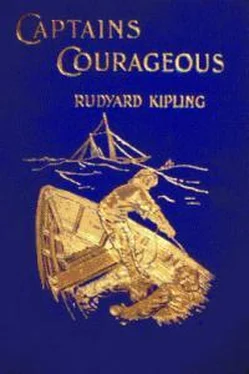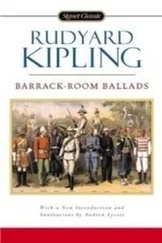He had taken the wife to his raw new palace in San Diego, where she and her people occupied a wing of great price, and Cheyne, in a veranda–room, between a secretary and a typewriter, who was also a telegraphist, toiled along wearily from day to day. There was a war of rates among four Western railroads in which he was supposed to be interested; a devastating strike had developed in his lumber camps in Oregon, and the legislature of the State of California, which has no love for its makers, was preparing open war against him.
Ordinarily he would have accepted battle ere it was offered, and have waged a pleasant and unscrupulous campaign. But now he sat limply, his soft black hat pushed forward on to his nose, his big body shrunk inside his loose clothes, staring at his boots or the Chinese junks in the bay, and assenting absently to the secretary's questions as he opened the Saturday mail.
Cheyne was wondering how much it would cost to drop everything and pull out. He carried huge insurances, could buy himself royal annuities, and between one of his places in Colorado and a little society (that would do the wife good), say in Washington and the South Carolina islands, a man might forget plans that had come to nothing. On the other hand—
The click of the typewriter stopped; the girl was looking at the secretary, who had turned white.
He passed Cheyne a telegram repeated from San Francisco:
Picked up by fishing schooner We're Here having fallen off boat great times on Banks fishing all well waiting Gloucester Mass care Disko Troop for money or orders wire what shall do and how is Mama Harvey N. Cheyne.
The father let it fall, laid his head down on the roller–top of the shut desk, and breathed heavily. The secretary ran for Mrs. Cheyne's doctor who found Cheyne pacing to and fro.
"What—what d' you think of it? Is it possible? Is there any meaning to it? I can't quite make it out," he cried.
"I can," said the doctor. "I lose seven thousand a year—that's all." He thought of the struggling New York practice he had dropped at Cheyne's imperious bidding, and returned the telegram with a sigh.
"You mean you'd tell her? 'May be a fraud?"
"What's the motive?" said the doctor, coolly. "Detection's too certain. It's the boy sure enough."
Enter a French maid, impudently, as an indispensable one who is kept on only by large wages.
"Mrs. Cheyne she say you must come at once. She think you are seek."
The master of thirty millions bowed his head meekly and followed Suzanne; and a thin, high voice on the upper landing of the great white–wood square staircase cried: "What is it? What has happened?"
No doors could keep out the shriek that rang through the echoing house a moment later, when her husband blurted out the news.
"And that's all right," said the doctor, serenely, to the typewriter. "About the only medical statement in novels with any truth to it is that joy don't kill, Miss Kinzey."
"I know it; but we've a heap to do first." Miss Kinzey was from Milwaukee, somewhat direct of speech; and as her fancy leaned towards the secretary, she divined there was work in hand. He was looking earnestly at the vast roller–map of America on the wall.
"Milsom, we're going right across. Private car—straight through—Boston. Fix the connections," shouted Cheyne down the staircase.
"I thought so."
The secretary turned to the typewriter, and their eyes met (out of that was born a story—nothing to do with this story). She looked inquiringly, doubtful of his resources. He signed to her to move to the Morse as a general brings brigades into action. Then he swept his hand musician–wise through his hair, regarded the ceiling, and set to work, while Miss Kinzey's white fingers called up the Continent of America.
" K. H. Wade, Los Angeles— The 'Constance' is at Los Angeles, isn't she, Miss Kinzey?"
"Yep." Miss Kinzey nodded between clicks as the secretary looked at his watch.
"Ready? Send 'Constance,' private car, here, and arrange for special to leave here Sunday in time to connect with New York Limited at Sixteenth Street, Chicago, Tuesday next ."
Click–click–click! "Couldn't you better that?"
"Not on those grades. That gives 'em sixty hours from here to Chicago. They won't gain anything by taking a special east of that. Ready? Also arrange with Lake Shore and Michigan Southern to take 'Constance' on New York Central and Hudson River Buffalo to Albany, and B. and A. the same Albany to Boston. Indispensable I should reach Boston Wednesday evening. Be sure nothing prevents. Have also wired Canniff, Toucey, and Barnes. —Sign, Cheyne."
Miss Kinzey nodded, and the secretary went on.
"Now then. Canniff, Toucey, and Barnes, of course. Ready? Canniff, Chicago. Please take my private car 'Constance' from Santa Fe at Sixteenth Street next Tuesday p. m. on N. Y. Limited through to Buffalo and deliver N. Y. C. for Albany. —Ever bin to N' York, Miss Kinzey? We'll go some day.—Ready? Take car Buffalo to Albany on Limited Tuesday p. m. That's for Toucey."
"Haven't bin to Noo York, but I know that!" with a toss of the head.
"Beg pardon. Now, Boston and Albany, Barnes, same instructions from Albany through to Boston. Leave three–five P. M. (you needn't wire that); arrive nine–five P. M. Wednesday. That covers everything Wade will do, but it pays to shake up the managers."
"It's great," said Miss Kinzey, with a look of admiration. This was the kind of man she understood and appreciated.
"'Tisn't bad," said Milsom, modestly. "Now, any one but me would have lost thirty hours and spent a week working out the run, instead of handing him over to the Santa Fe straight through to Chicago."
"But see here, about that Noo York Limited. Chauncey Depew himself couldn't hitch his car to her," Miss Kinzey suggested, recovering herself.
"Yes, but this isn't Chauncey. It's Cheyne—lightning. It goes."
"Even so. Guess we'd better wire the boy. You've forgotten that, anyhow."
"I'll ask."
When he returned with the father's message bidding Harvey meet them in Boston at an appointed hour, he found Miss Kinzey laughing over the keys. Then Milsom laughed too, for the frantic clicks from Los Angeles ran: "We want to know why–why–why? General uneasiness developed and spreading."
Ten minutes later Chicago appealed to Miss Kinzey in these words: "If crime of century is maturing please warn friends in time. We are all getting to cover here."
This was capped by a message from Topeka (and wherein Topeka was concerned even Milsom could not guess): "Don't shoot, Colonel. We'll come down."
Cheyne smiled grimly at the consternation of his enemies when the telegrams were laid before him. "They think we're on the warpath. Tell 'em we don't feel like fighting just now, Milsom. Tell 'em what we're going for. I guess you and Miss Kinsey had better come along, though it isn't likely I shall do any business on the road. Tell 'em the truth—for once."
So the truth was told. Miss Kinzey clicked in the sentiment while the secretary added the memorable quotation, "Let us have peace," and in board rooms two thousand miles away the representatives of sixty–three million dollars' worth of variously manipulated railroad interests breathed more freely. Cheyne was flying to meet the only son, so miraculously restored to him. The bear was seeking his cub, not the bulls. Hard men who had their knives drawn to fight for their financial lives put away the weapons and wished him God–speed, while half a dozen panic–smitten tin–pot toads perked up their heads and spoke of the wonderful things they would have done had not Cheyne buried the hatchet.
It was a busy week–end among the wires; for now that their anxiety was removed, men and cities hastened to accommodate. Los Angeles called to San Diego and Barstow that the Southern California engineers might know and be ready in their lonely roundhouses; Barstow passed the word to the Atlantic and Pacific; and Albuquerque flung it the whole length of the Atchinson, Topeka, and Santa Fe management, even into Chicago. An engine, combination–car with crew, and the great and gilded "Constance" private car were to be "expedited" over those two thousand three hundred and fifty miles. The train would take precedence of one hundred and seventy–seven others meeting and passing; despatchers and crews of every one of those said trains must be notified. Sixteen locomotives, sixteen engineers, and sixteen firemen would be needed—each and every one the best available. Two and one half minutes would be allowed for changing engines, three for watering, and two for coaling. "Warn the men, and arrange tanks and chutes accordingly; for Harvey Cheyne is in a hurry, a hurry, a hurry," sang the wires. "Forty miles an hour will be expected, and division superintendents will accompany this special over their respective divisions. From San Diego to Sixteenth Street, Chicago, let the magic carpet be laid down. Hurry! Oh, hurry!"
Читать дальше












